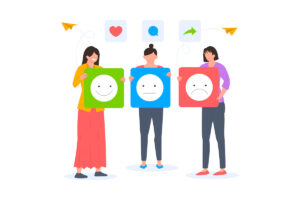When situations are facilitated effectively – structures are taken into context, processes are created that boost efficiency and the right people are involved.
All good so far.
But as the title of this article suggests, life doesn’t always run this smoothly. Most personal and professional situations are beyond your control, so it’s difficult to facilitate them.
Life just isn’t naturally facilitated. It’s a melting pot of contexts, personalities, and variables and we’re all just doing our darn best to muddle through.
[Tweet “Life just isn’t naturally facilitated. It’s a melting pot of contexts, personalities, and variables and we’re all just doing our darn best to muddle through. via @bryankramer”]
There are things you can do to implement elements of control and facilitate situations that come your way though. You might not get amazing results all the time, but you can head into situations with a blueprint for your own personal form of facilitation.
Hack the Hierarchy
Hierarchal work or even home structures can end up paralyzing people’s creativity. When there’s a project that your team’s working on, the senior members usually take control – especially if there’s an issue that needs to be rectified.
Not everyone feels confident about speaking out and adding their thoughts.
Managers become facilitators by default, but that doesn’t mean they necessarily have the best insight or skills to propose solutions.
Hacking the hierarchy means that people that are effective facilitators should try to sidestep the status-quo and come up with solutions and build relationships, regardless of whether they’re senior or not.
Once you start to dismantle rigid structures at work, people feel free to unleash their creativity more and aren’t as constrained by power dynamics. Making everyone feel equal can work wonders.
Avoid GroupThink
A tendency to groupthink in team meetings and personal scenarios can also stifle the ideation process and prevent imaginative solutions.
Senior leaders or people that are leading a meeting have usually come up with their own agenda. They might have created notes or a presentation based on their own pre-conceived ideas.
For whatever reason, perhaps because of social etiquette, team members might not want to disagree with the work and effort the leader has put into the schedule, even if they have better ideas.
If a power dynamic or hierarchy is rigid then people might not say what they think. And meetings can be one of the worst places to come up with new ideas if team members aren’t confident and comfortable. There could be lots of people, so it’s overwhelming to speak up and people use the initial schedule as a crutch.
It’s a good idea to avoid sending schedules or notes because people have a chance to come up with their own thoughts individually beforehand. Urging people to get in contact with their thoughts privately can be a way to carry on conversations too.
Emotional Intelligence
Being more open and authentic in relationships in your personal and professional life can really improve how you approach situations. Life isn’t smooth and expertly facilitated, but you can create more transparency with better communication.
Having emotional intelligence is an incredibly important skill in the modern workplace and home life, if not the most important. Empathizing with others and being able to put yourself in their shoes means that you can think outside the box and from other people’s perspectives.
This strengthens your own ideas and the input you can encourage from those around you. You can connect with people in a way that makes them feel valued and part of a unit that wants to hear their contributions.
Embrace Diversity
Populations are becoming more and more diverse and with this comes different perspectives, ways of thinking and a range of creative problem-solving. As workplaces and situations embrace diversity, it’s important that a diversity of thought is applied to facilitating and getting the best out of people.
Finding ways to channel new ideas and perspectives is really important. Smaller groups, individual thinking, one-on-one meetings, and effective communication – these are all ways to build relationships with people to create contexts that can utilize the unique characteristics and traits people bring to the table. Even changing the time spent in meetings or sessions can rapidly change the amount of quality content that you can generate from a meeting.
Diverse workforces must also be able to have open and honest conversations around inclusion and bias to ensure that people have connected and comfortable experiences at home and in work.
Collaboration isn’t easy or natural when people are not feeling happy and satisfied with their situation.
Final Thoughts
Life is incredibly chaotic and unpredictable, which makes it almost impossible to facilitate properly. However, with the points I’ve highlighted, you can work towards making it more open to facilitation. There are elements of your professional and personal life that you can influence, so working on those areas and molding them in a way that makes them more controllable will help you to create better processes.
Trying to use your individual, unique traits to bring something new to situations and not being daunted by hierarchal power structures will help you to see scenarios more clearly and take action.





